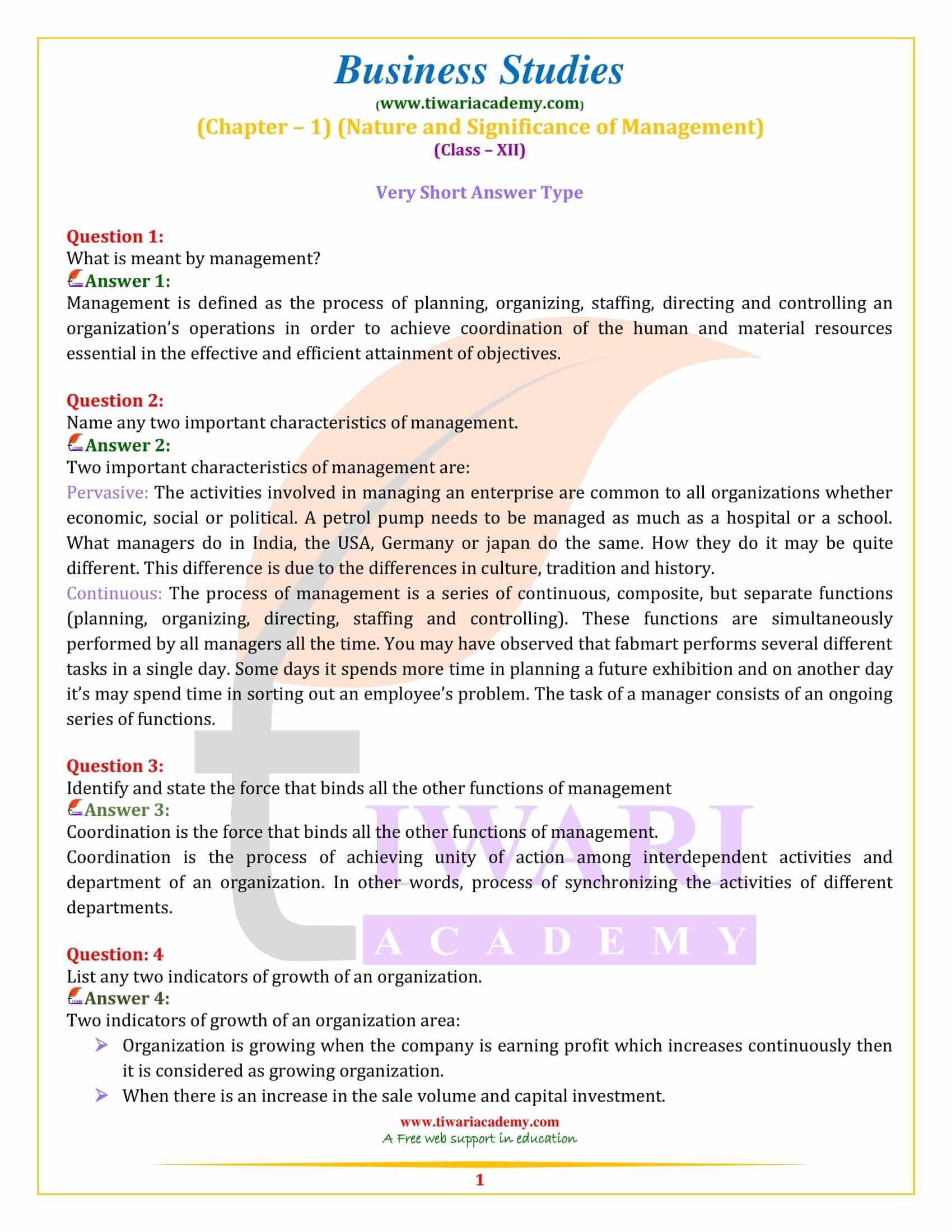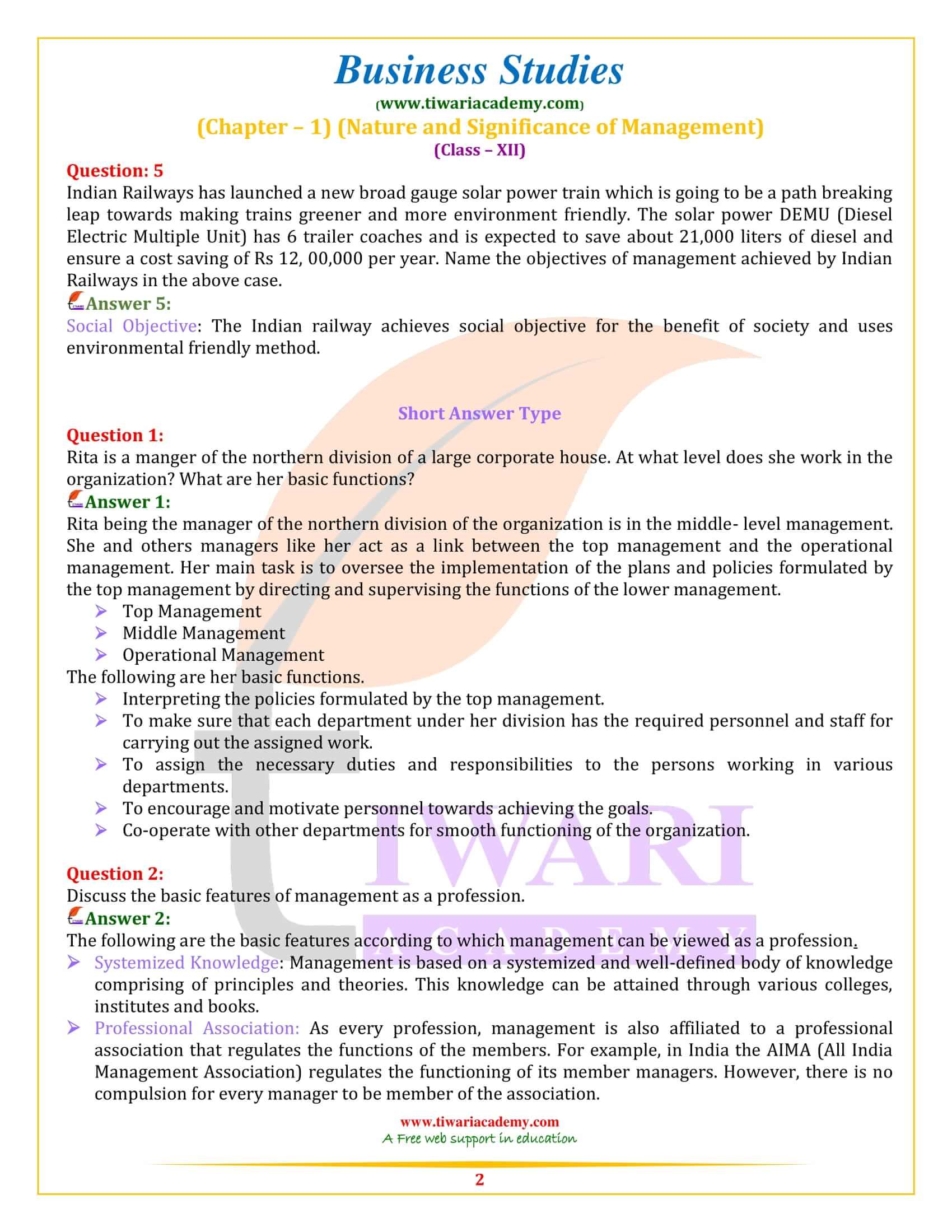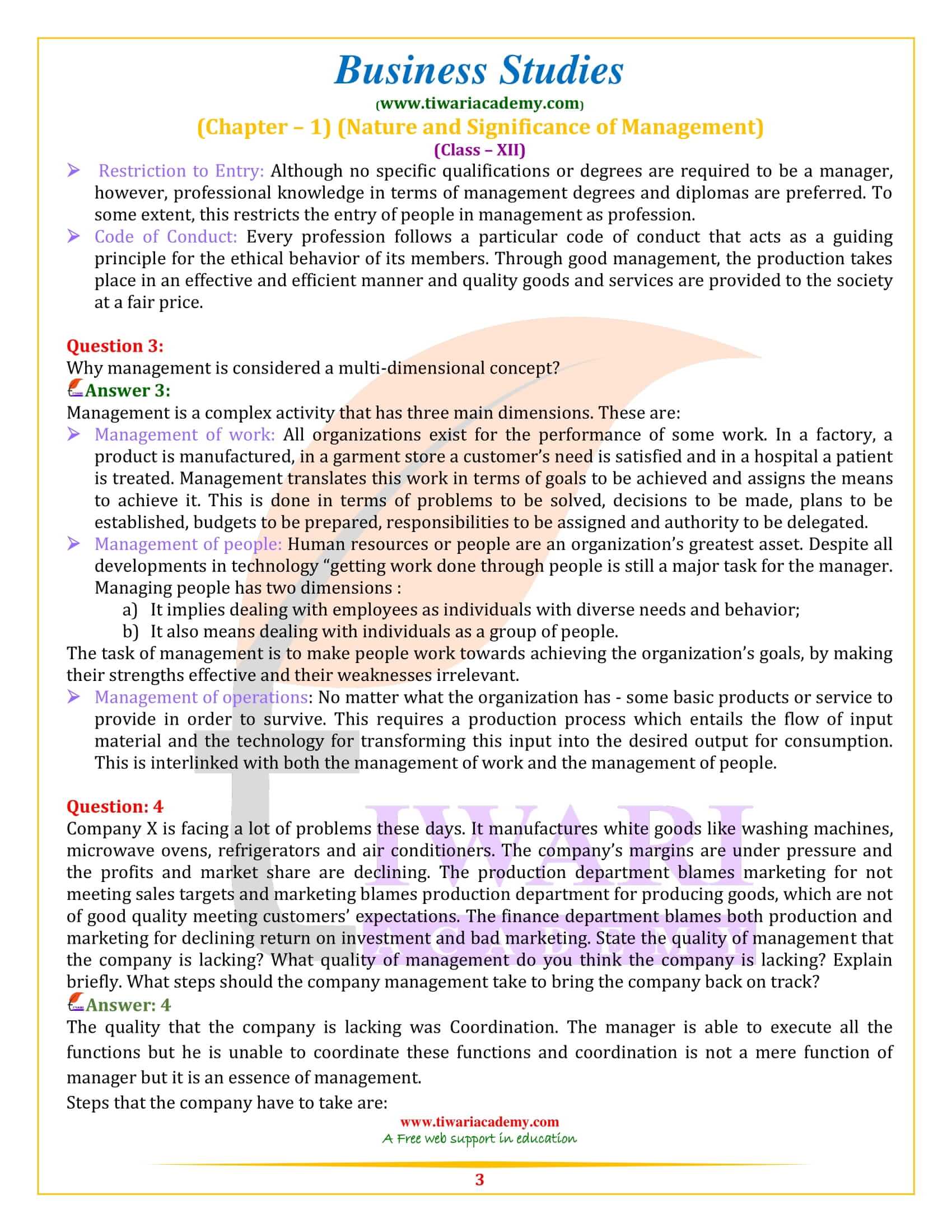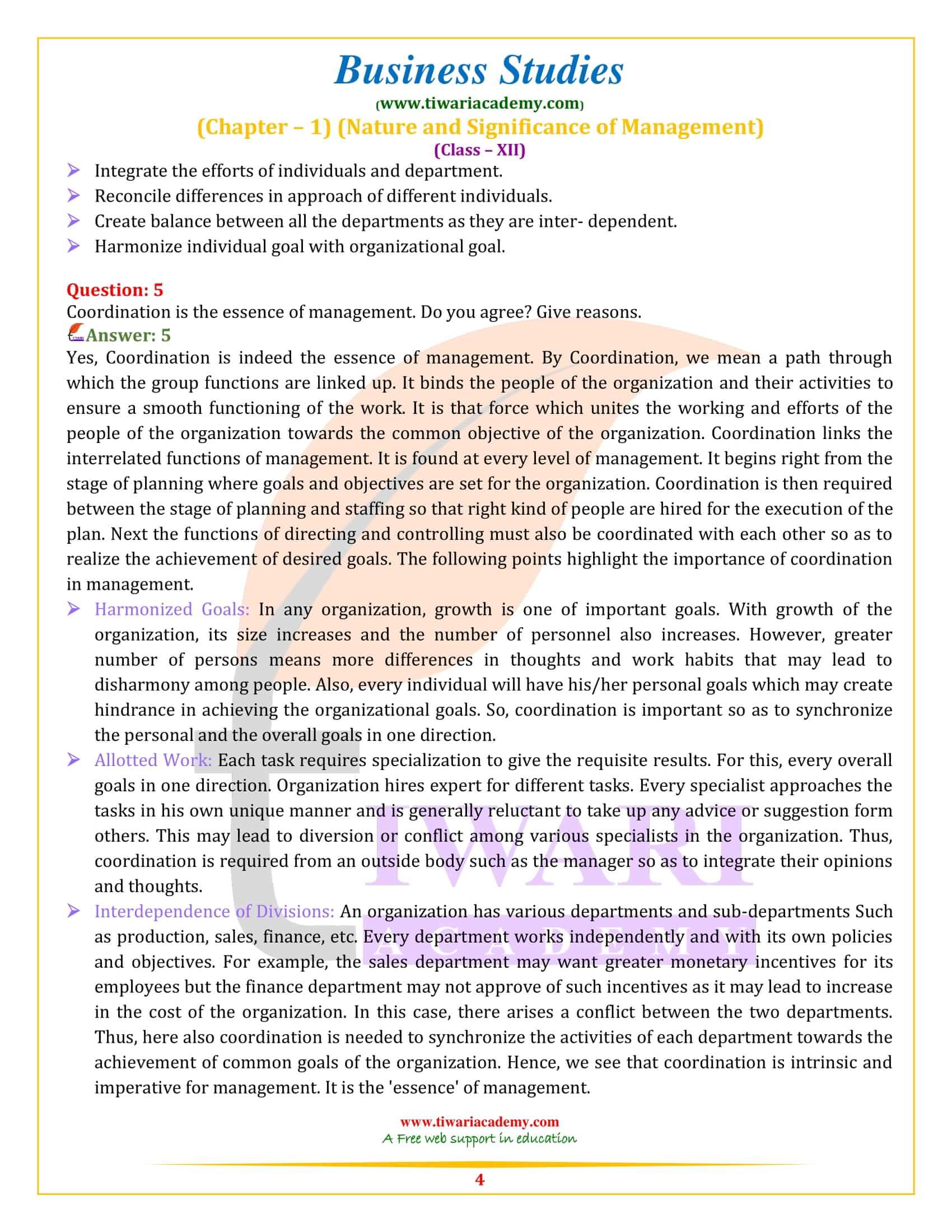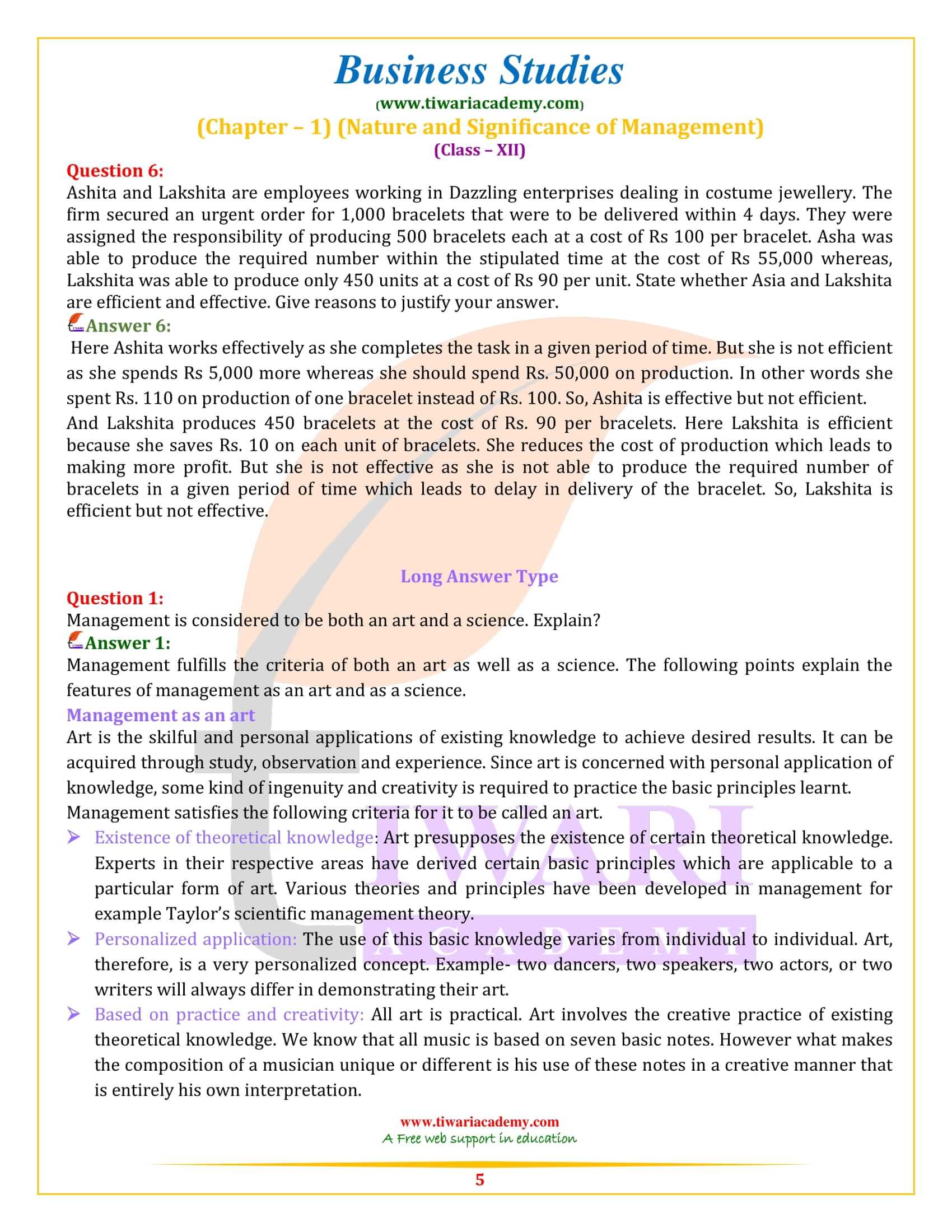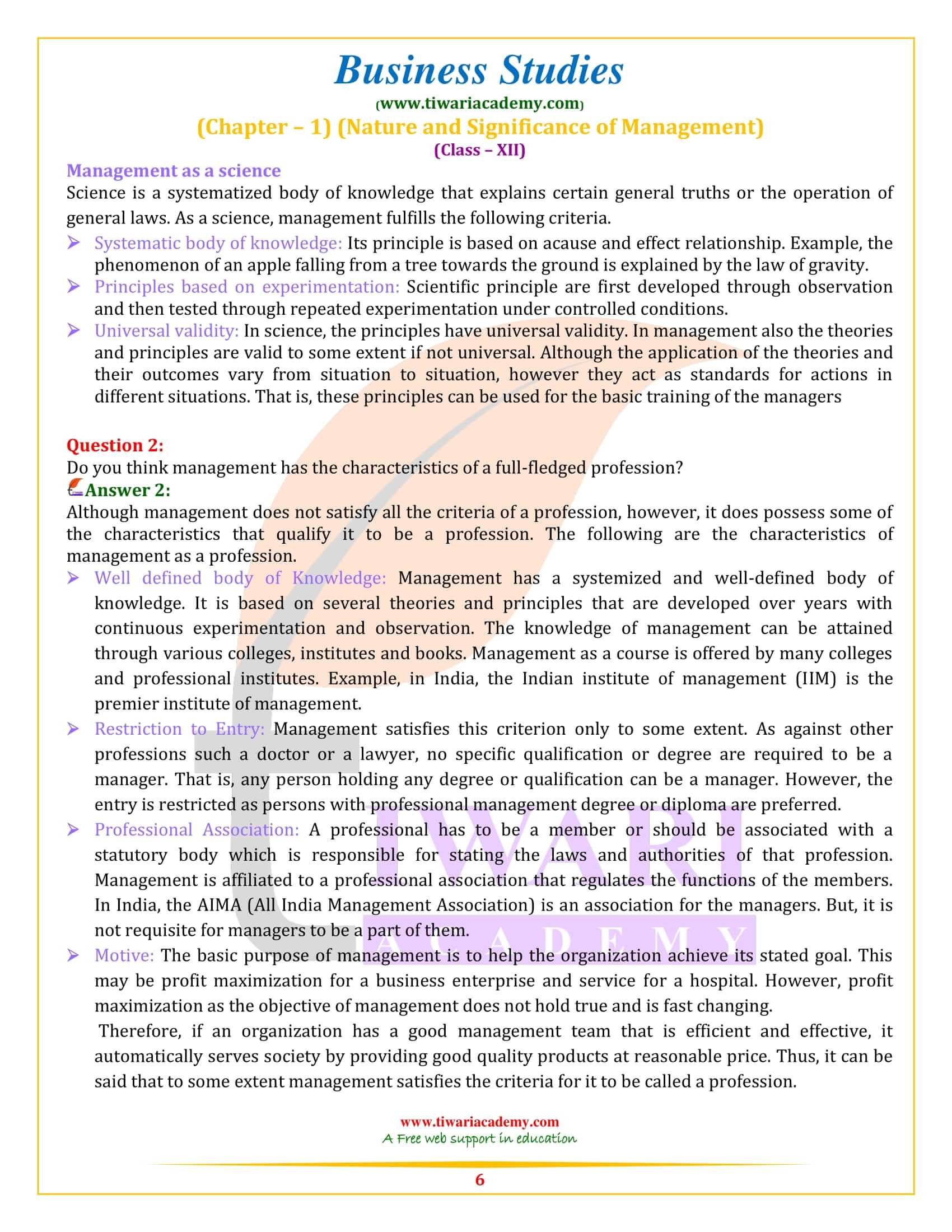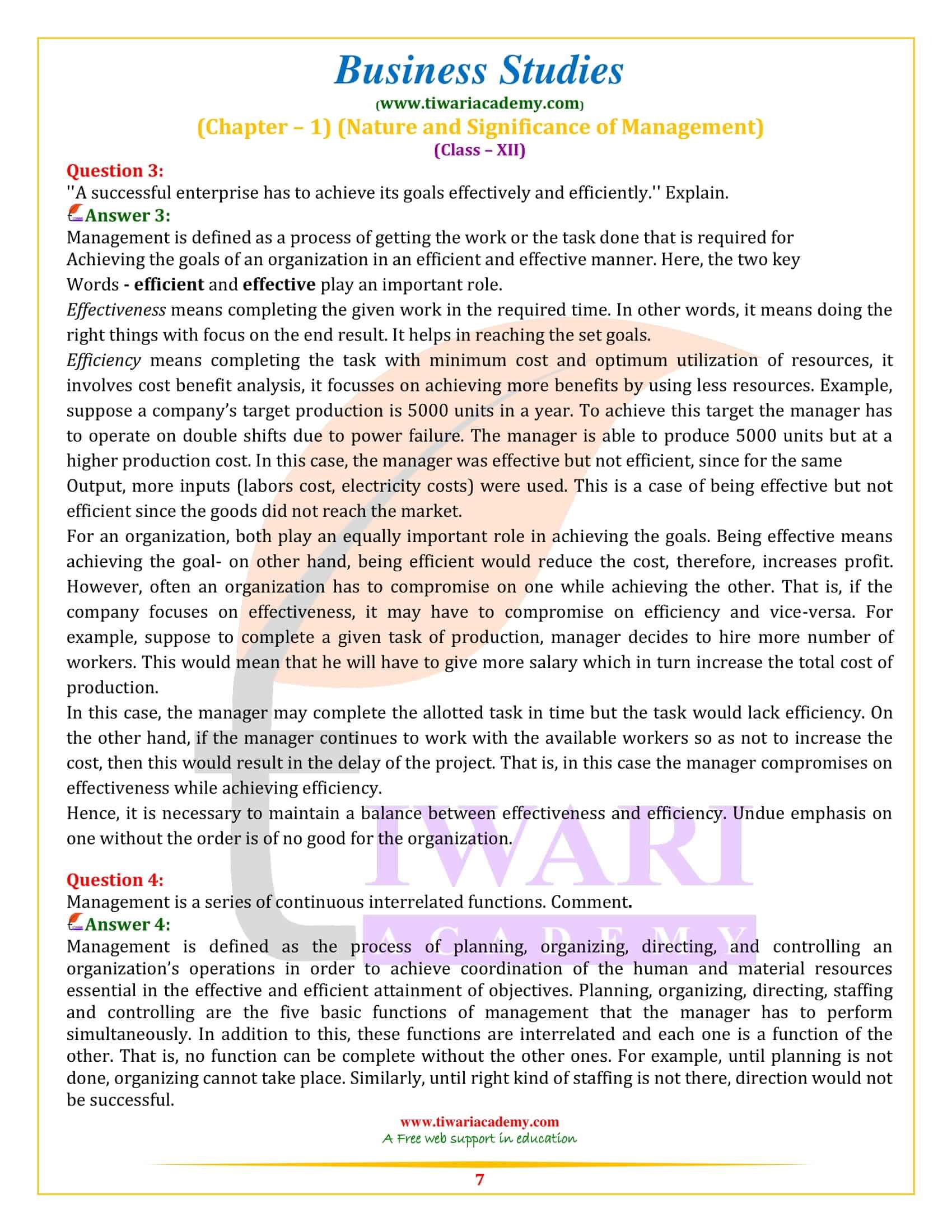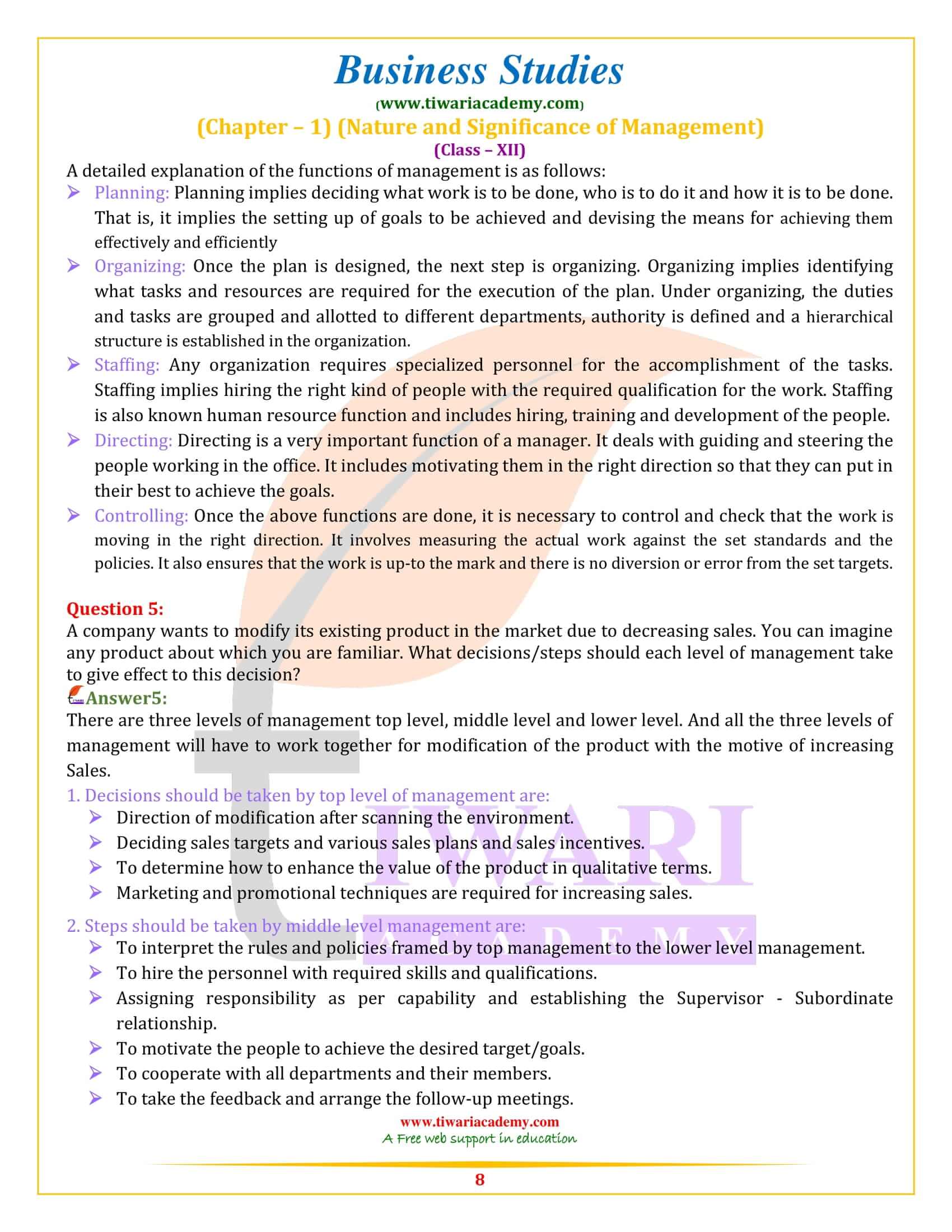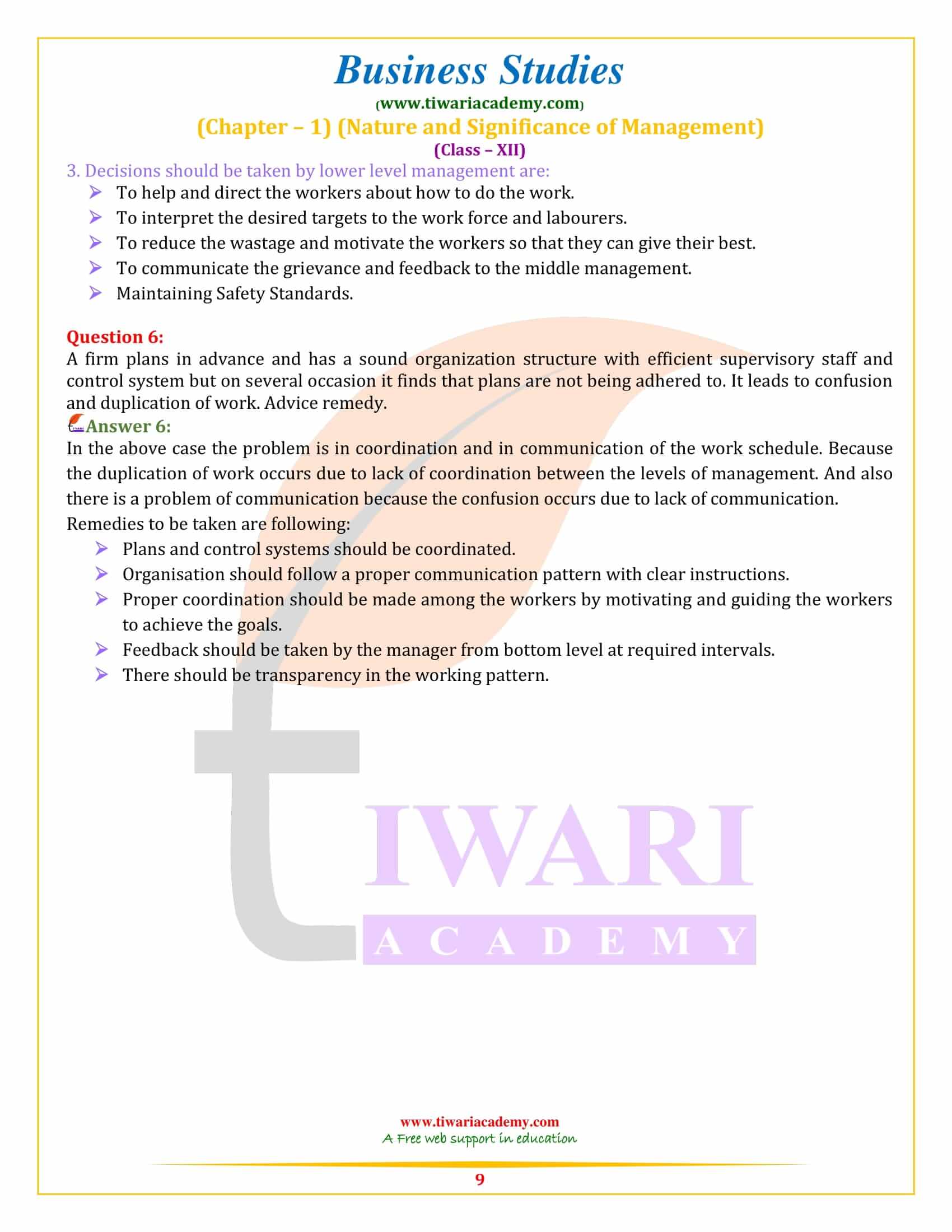NCERT Solutions for Class 12 Business Studies Chapter 1 Nature and Significance of Management updated for Session 2025-26. All the answers are prepared as per new syllabus issued by CBSE. Class 12 Business Studies Part 1 Chapter 1 is given here with all types of questions.
Help for Viva Voice for Class 12 Business Studies
NCERT Solutions for Class 12 Business Studies Chapter 1
Class 12 Business Studies Chapter 1 NCERT Solutions
- Class 12 Business Studies Chapter 1 Solutions
- Class 12 Business Studies Chapter 1 MCQ
- Very Short Answers Questions Chapter 1
- Short Answers Questions Chapter 1
- Long Answers Questions Chapter 1
- Study Material English Medium
- NCERT Book Chapter 1 in English
- Study Material Hindi Medium
- NCERT Book Chapter 1 in Hindi
- Class 12 Business Studies NCERT Solutions
- Class 12 all Subjects NCERT Solutions
Short Answer Type Questions
Class 12 Business Studies Chapter 1 Short Answer Type Questions
What is management?
Management is the process of designing and maintaining an environment in which individuals, working together in groups, efficiently accomplish selected aims.
Why is management considered both an art and a science?
Management is an art because it involves the skillful application of knowledge to achieve desired results. It is considered a science because it has a systematized body of knowledge and follows general principles.
What are the functions of management?
The functions of management include planning, organizing, staffing, directing, and controlling.
What does effectiveness in management entail?
Effectiveness in management means completing activities and achieving goals, essentially doing the right task and reaching the intended end result.
How does efficiency relate to management?
Efficiency in management refers to doing tasks correctly with minimum cost, involving a cost-benefit analysis to maximize resource utilization.
Can management be considered a profession, and why?
Management shares some characteristics with professional fields, such as a systematic body of knowledge and educational pathways. However, it lacks strict entry regulations like other professions and cannot be called a profession.
What is the role of coordination in management?
Coordination in management involves synchronizing the efforts of various departments and aligning activities and efforts towards achieving organizational goals effectively.
What is meant by management?
Management is defined as the process of planning, organizing, staffing, directing and controlling an organization’s operations in order to achieve coordination of the human and material resources essential in the effective and efficient attainment of objectives.
Name any two important characteristics of management.
Two important characteristics of management are:
Pervasive: The activities involved in managing an enterprise are common to all organizations whether economic, social or political. A petrol pump needs to be managed as much as a hospital or a school. What managers do in India, the USA, Germany or japan do the same. How they do it may be quite different. This difference is due to the differences in culture, tradition and history.
Continuous: The process of management is a series of continuous, composite, but separate functions (planning, organizing, directing, staffing and controlling). These functions are simultaneously performed by all managers all the time. You may have observed that fabmart performs several different tasks in a single day. Some days it spends more time in planning a future exhibition and on another day it’s may spend time in sorting out an employee’s problem. The task of a manager consists of an ongoing series of functions.
Identify and state the force that binds all the other functions of management.
Coordination is the force that binds all the other functions of management.
Coordination is the process of achieving unity of action among interdependent activities and department of an organization. In other words, process of synchronizing the activities of different departments.
List any two indicators of growth of an organization.
Two indicators of growth of an organization area:
- Organization is growing when the company is earning profit which increases continuously then it is considered as growing organization.
- When there is an increase in the sale volume and capital investment.
Indian Railways has launched a new broad gauge solar power train which is going to be a path breaking leap towards making trains greener and more environment friendly. The solar power DEMU (Diesel Electric Multiple Unit) has 6 trailer coaches and is expected to save about 21,000 liters of diesel and ensure a cost saving of Rs 12, 00,000 per year. Name the objectives of management achieved by Indian Railways in the above case.
Social Objective: The Indian railway achieves social objective for the benefit of society and uses environmental friendly method.
Short Answer Type
Class 12 Business Studies Chapter 1 Important Question Answers
Why is planning considered a critical management function?
Planning involves setting objectives and deciding in advance the best course of action to achieve these goals, making it essential for systematic growth and achieving efficiency.
What does organizing entail in management?
Organizing in management refers to arranging resources and tasks in a structured way to achieve the organization’s goals, involving the delegation of authority and assignment of responsibilities.
What is the importance of staffing in management?
Staffing ensures that the organization has the right people with the right skills in the right positions to achieve its objectives, which involves recruitment, selection, and placement.
Describe the directing function of management.
Directing is about leading, motivating, and providing direction to staff to ensure they work towards the organization’s goals. It includes supervision,leadership, communication, and motivation.
What does controlling involve in management?
Controlling involves setting performance standards, measuring actual performance, and taking corrective actions to ensure that organization’s objectives are achieved.
How do top managers contribute to an organization?
Top managers set overall goals, formulate strategies, and ensure the organization’s long-term survival and growth by aligning various departments towards common objectives.
What are the tasks of middle management?
Middle managers translate top management strategies into operational plans, coordinate departments, and ensure resources are available to achieve these plans.
What is the role of supervisory or operational management?
Supervisory managers directly oversee the work of frontline employees, ensuring tasks are performed efficiently and effectively, maintaining quality and meeting production targets.
What is the significance of the systems approach in management?
The systems approach views the organization as a system composed of interrelated parts, emphasizing the importance of coordination and interaction between these parts for organizational success.
Rita is a manger of the northern division of a large corporate house. At what level does she work in the organization? What are her basic functions?
Rita being the manager of the northern division of the organization is in the middle- level management. She and others managers like her act as a link between the top management and the operational management. Her main task is to oversee the implementation of the plans and policies formulated by the top management by directing and supervising the functions of the lower management.
1. Top Management
2. Middle Management
3. Operational Management
The following are her basic functions.
1. Interpreting the policies formulated by the top management.
2. To make sure that each department under her division has the required personnel and staff for carrying out the assigned work.
- To assign the necessary duties and responsibilities to the persons working in various departments.
- To encourage and motivate personnel towards achieving the goals.
- Co-operate with other departments for smooth functioning of the organization.
Discuss the basic features of management as a profession.
The following are the basic features according to which management can be viewed as a profession.
- Systemized Knowledge: Management is based on a systemized and well-defined body of knowledge comprising of principles and theories. This knowledge can be attained through various colleges, institutes and books.
- Professional Association: As every profession, management is also affiliated to a professional association that regulates the functions of the members. For example, in India the AIMA (All India Management Association) regulates the functioning of its member managers. However, there is no compulsion for every manager to be member of the association.
- Restriction to Entry: Although no specific qualifications or degrees are required to be a manager, however, professional knowledge in terms of management degrees and diplomas are preferred. To some extent, this restricts the entry of people in management as profession.
- Code of Conduct: Every profession follows a particular code of conduct that acts as a guiding principle for the ethical behavior of its members. Through good management, the production takes place in an effective and efficient manner and quality goods and services are provided to the society at a fair price.
Class 12 Business Studies Chapter 1 New Pattern Question Answers
How does globalization affect management practices?
Globalization requires managers to adapt and manage across cultural, geographical, and economic boundaries, necessitating a broader understanding of global markets and practices.
What impact does technology have on management?
Technology influences management through the introduction of new tools and platforms for communication, data management, and operations, enhancing efficiency and enabling more informed decision-making.
Why is ethical conduct important in management?
Ethical conduct ensures that the organization and its managers act responsibly towards employees, customers, and the community, maintaining trust and a good reputation.
How does management help in achieving personal objectives of employees?
Management helps align individual goals with organizational objectives through motivation, leadership, and creating opportunities for personal and professional growth.
What challenges do managers face in a dynamic environment?
Managers face the challenge of adapting to rapid changes in the market, technology, and regulations, requiring flexibility and continuous learning.
How does management contribute to societal development?
Management drives societal development by providing employment, adopting sustainable practices, and contributing to economic growth.
What is strategic management and its importance?
Strategic management involves long-term planning and positioning of the organization in a way that maximizes its competitiveness and effectiveness in the market.
What are managerial ethics?
Managerial ethics are the moral principles that guide the behaviours and decisions of managers, ensuring fairness, transparency, and integrity in business practices.
Why management is considered a multi-dimensional concept?
Management is a complex activity that has three main dimensions. These are:
1. Management of work: All organizations exist for the performance of some work. In a factory, a product is manufactured, in a garment store a customer’s need is satisfied and in a hospital a patient is treated. Management translates this work in terms of goals to be achieved and assigns the means to achieve it. This is done in terms of problems to be solved, decisions to be made, plans to be established, budgets to be prepared, responsibilities to be assigned and authority to be delegated.
2. Management of people: Human resources or people are an organization’s greatest asset. Despite all developments in technology “getting work done through people is still a major task for the manager. Managing people has two dimensions :
a) It implies dealing with employees as individuals with diverse needs and behavior;
b) It also means dealing with individuals as a group of people.
The task of management is to make people work towards achieving the organization’s goals, by making their strengths effective and their weaknesses irrelevant.
3. Management of operations: No matter what the organization has – some basic products or service to provide in order to survive. This requires a production process which entails the flow of input material and the technology for transforming this input into the desired output for consumption. This is interlinked with both the management of work and the management of people.
Long Answer Type
Class 12 Business Studies Chapter 1 Revision Question Answers
How do managers deal with conflicts within an organization?
Managers address conflicts through negotiation, mediation, and setting clear policies for communication and behaviour within the organization.
What is the role of a manager in crisis management?
In crisis management, a manager’s role is to lead the organization through emergencies by making quick decisions, communicating effectively, and ensuring the safety and continuity of operations.
How does management facilitate innovation?
Management facilitates innovation by creating an environment that encourages creativity, investing in research and development, and supporting initiatives that drive new ideas.
What are the qualities of an effective manager?
Effective managers possess qualities such as leadership, strategic thinking, empathy, communication skills, and the ability to motivate and inspire teams.
What role does communication play in management?
Communication in management is essential for disseminating information, ensuring alignment with goals, and fostering a collaborative work environment.
Management is considered to be both an art and a science. Explain?
Management fulfills the criteria of both an art as well as a science. The following points explain the features of management as an art and as a science.
Management as an art
Art is the skillful and personal applications of existing knowledge to achieve desired results. It can be acquired through study, observation and experience. Since art is concerned with personal application of knowledge, some kind of ingenuity and creativity is required to practice the basic principles learnt.
Management satisfies the following criteria for it to be called an art.
1. Existence of theoretical knowledge: Art presupposes the existence of certain theoretical knowledge. Experts in their respective areas have derived certain basic principles which are applicable to a particular form of art. Various theories and principles have been developed in management for example Taylor’s scientific management theory.
2. Personalized application: The use of this basic knowledge varies from individual to individual. Art, therefore, is a very personalized concept. Example- two dancers, two speakers, two actors, or two writers will always differ in demonstrating their art.
3. Based on practice and creativity: All art is practical. Art involves the creative practice of existing theoretical knowledge. We know that all music is based on seven basic notes. However what makes the composition of a musician unique or different is his use of these notes in a creative manner that is entirely his own interpretation.
Management as a science
Science is a systematized body of knowledge that explains certain general truths or the operation of general laws. As a science, management fulfills the following criteria.
1. Systematic body of knowledge: Its principle is based on a cause and effect relationship. Example, the phenomenon of an apple falling from a tree towards the ground is explained by the law of gravity.
2. Principles based on experimentation: Scientific principle are first developed through observation and then tested through repeated experimentation under controlled conditions.
3. Universal validity: In science, the principles have universal validity. In management also the theories and principles are valid to some extent if not universal. Although the application of the theories and their outcomes vary from situation to situation, however they act as standards for actions in different situations. That is, these principles can be used for the basic training of the managers
Do you think management has the characteristics of a full-fledged profession?
Although management does not satisfy all the criteria of a profession, however, it does possess some of the characteristics that qualify it to be a profession. The following are the characteristics of management as a profession.
1. Well defined body of Knowledge: Management has a systemized and well-defined body of knowledge. It is based on several theories and principles that are developed over years with continuous experimentation and observation. The knowledge of management can be attained through various colleges, institutes and books. Management as a course is offered by many colleges and professional institutes. Example, in India, the Indian institute of management (IIM) is the premier institute of management.
2. Restriction to Entry: Management satisfies this criterion only to some extent. As against other professions such a doctor or a lawyer, no specific qualification or degree are required to be a manager. That is, any person holding any degree or qualification can be a manager. However, the entry is restricted as persons with professional management degree or diploma are preferred.
3. Professional Association: A professional has to be a member or should be associated with a statutory body which is responsible for stating the laws and authorities of that profession. Management is affiliated to a professional association that regulates the functions of the members. In India, the AIMA (All India Management Association) is an association for the managers. But, it is not requisite for managers to be a part of them.
4. Motive: The basic purpose of management is to help the organization achieve its stated goal. This may be profit maximization for a business enterprise and service for a hospital. However, profit maximization as the objective of management does not hold true and is fast changing.
Therefore, if an organization has a good management team that is efficient and effective, it automatically serves society by providing good quality products at reasonable price. Thus, it can be said that to some extent management satisfies the criteria for it to be called a profession.
FAQs
What is the chapter 1 of Class 12 Business Studies all about?
This is an introductory chapter explaining the functions of management, the levels of management in an organization and it also explains the importance of coordination as an essence of management.
Is the chapter 1 of 12 B. St. having any practical importance?
This is the foundation for the study of management as a discipline. Discipline means separate field of study.
What are the main important questions from Class 12 B St Chapter 1?
Few of the important question from this topic are functions of different levels of management, importance of coordination, management as a science, art and profession.
What should be kept in mind while revising Chapter 1 of 12th Business Studies?
The significance of management and the significance of principles of management (chapter 2) are similar questions. One should be careful in the examination.
